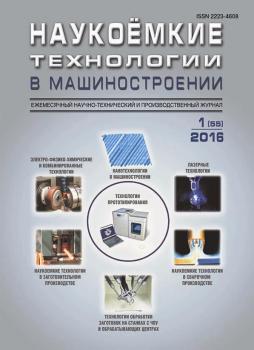employee
Bryansk, Bryansk, Russian Federation
Bryansk, Bryansk, Russian Federation
There is stated a choice of a technological mode for diamond abrasion ensuring a required process capacity and silicon carbide plate quality. The correlations of a silicon carbide removal rate with the length of surface micro-cracks with the roughness height of a surface are stated. A procedure is offered for setting technological modes which do not result in plate billet destruction during manufacturing special devices.
diamond abrasion capacity, micro-cracks, surface roughness, silicon carbide plates
1. Dushko, O.V. Diamond Abrasion of Silicon Carbide Ceramics for Mechanical Engineering / O.V. Dushko, V.M. Shu-myacher. - Volgograd: VolgGASU, 2009. - pp. 80.
2. Bishutin, S.G., Alyokhin, S.S. Technology improvement of silicon carbide plate finish abrasion // Bulletin of Bryansk State Technical University. - 2018. - No.5(66). - pp. 9-13.
3. Bishutin, S.G., Alyokhin, S.S. Capacity and quality of silicon carbide plate diamond abrasion // Bulletin of Voronezh State Technical University. - 2019. - Vol. 15. - No.2. - pp. 159-164.
4. Pilipenko, V.A. Speed Thermal Treatment in SBIS Technology / V.A. Pilipenko. - Minsk: BSU, 2004. - pp. 531.
5. Muzhichenko, O.G., Plis, N. Thermal stresses in assembly units at BIS mounting. Calculation and experiment // Electronics: Science, Technology. Business. - 2000. - No.6(30). - pp. 63-65.
6. Mezhenny, M.V., Milvidsky, M.G., Prostomolotov, A.I. Stress state modeling of large diameter silicon plates during thermal annealing // Physics of Solid. - 2003. - Vol.45. - No.10. - pp. 1794-1799.
7. Krainev, A.F. Machine Design: reference methodical manual: in 2 Vol. / A.F. Krainev, A.P. Gusenkov, V.V. Bolotin [et al.]; under the editorship of K.V. Frolov. - M.: Mechanical Engineering, 1994. - Vol.2. - pp. 624.
















